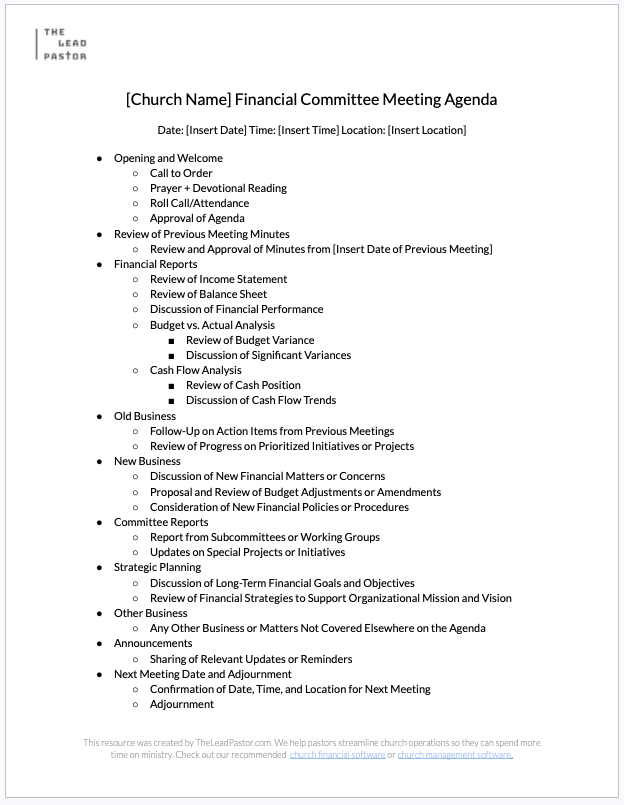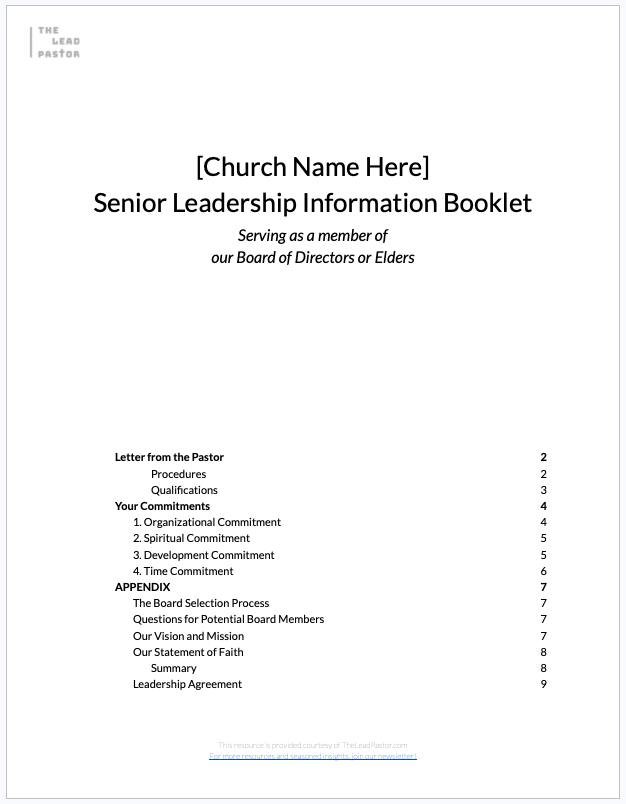

When a church financial committee works well, financial decisions are made quickly. Communication is clear and regular. Financial planning is consistent and effective. Sadly, many pastors have an altogether different experience with their church finance committee:
These symptoms can indicate deeper issues (such as poor planning, lack of trust in the church, ineffective structure, etc) that, left unsolved, will derail your church.
While there are some excellent software tools to help manage church finances, We'll unpack how a well-run finance committee can:
In this article, I tag-teamed with Jim Gordon, a senior pastor with 25+ years of experience leading staff, growing ministries, and impacting the community. Together, we dive into the ins and outs of church finance committees.
We'll provide some downloadable resources as well: a sample finance committee meeting agenda, and a template for onboarding new members of your church finance committee.

Jim's Frontline Insight:
The best way to deal with the church’s financial health in a very meaningful way is to make sure that you’re not the only one who’s carrying the load of financial controls. If you’re always looking at the finances, it’s easy to get discouraged. The practical reality is, you need a group of people that together carry the responsibility.
In broad terms, the church finance committee:
It's a multifaceted role that requires diligence, expertise, and a commitment to the church's financial health and integrity. This encompasses a range of duties, including budgeting, financial planning, monitoring income and expenses, ensuring compliance with financial regulations, and maintaining transparency with the congregation.
My team and I spent countless hours reviwing and compiling a list of industry-leading software tools to support church giving and tools to handle your church bookkeeping. I highly recommend them.
Depending on your church and denomination, the structure and functions of a church finance committee may vary slightly:
Remember; those who control the finances will hold significant influence, so it's important to ensure that the vision and values of the church remain the primary focus. While administration and finances are crucial, they should not overshadow the overarching mission and purpose of the church.
The church finance committee must protect the interests of the church as a whole. Do not form your board of directors or finance committee solely from representative interest groups, such as the youth ministry, or worship team. If you do, you're opening the committee to competing priorities.
Jim Gordon, senior pastor
Practically speaking, the function is fairly clear: to protect and direct the church.
A church needs a financial committee to provide oversight and stewardship of its financial resources. This committee ensures that funds are managed responsibly, transparently, and in accordance with the church's mission and values. By involving dedicated members in financial decision-making, the church can promote accountability, foster trust within the congregation, and sustain its long-term financial health and stability.
However, the finance committee is critical for another reason as well. Jim Gordon says, "Make sure that you as the lead pastor are not the only one who's carrying the financial load. Don't be alone in that - it's too big a burden for any one person to carry."

Acts 6 offers some great insight into this. In this passage, the apostles separate the roles of spiritual leadership from operational leadership. Jesus’s disciples, the leaders of the newly formed church, recognized the importance of having the right people in the right roles.
The apostles needed to focus on teaching the new church, so they commissioned deacons to oversee the operations of the church. Similarly, it’s important for you as the lead pastor to ensure that you have the right people in the key roles that allow your church to function as smoothly as possible.
From budgeting to compliance, the responsibilities of the finance committee are vital and diverse. Here are some of the primary ones:
This task involves estimating the expected income that the church will receive over the next year and then providing a framework for church budgeting and resource allocation. This might look like.

Sign up for regular insights on how to pastor and lead better.
By carefully considering the needs of each ministry team and having a clear understanding of the church's income and expenses, the finance committee will craft a budget that is practical and suitable for the church - while executing on its vision and values.
Josh's Frontline Insight:
Effective church budgeting must begin with you and your leadeership team asking the question, ‘What does God want us to do, and how can we get there?’
Being ready for emergencies within our church entails prudent planning and management to prepare for unexpected spending or being ready to respond to urgent needs within the church community. A few examples of this:
The wise decision-making and leadership that we are called to is built on clear, sound information–so creating church financial reports is a critical aspect of the church finance committee. This involves preparation and reporting of accurate and transparent financial information. Thrilling stuff? Not usually. Critically important? Always.
Protecting the resources and property owned by your church is a big part of stewardship. This duty involves implementing measures or policies to prevent the loss, theft, or misuse of assets, ensuring their security and longevity.
This duty involves ensuring that your church complies with all relevant laws, regulations, and financial standards. It entails keeping your church informed about financial regulations, tax laws, reporting requirements, and other legal obligations.
Generally speaking, if you can recruit an experienced accountant to the finance committee to oversee this, you'll be in good shape. This is a difficult, nuanced role for an inexperienced or untrained individual. If you don't have access to that - it's worthwhile consulting an expert. This is one area where errors can be extremely costly.
Creating and implementing financial policies and procedures will be immensely beneficial for your church. When done well, they will provide clear guidelines and protocols that safeguard your church.
Now it is required that those who have been given a trust must prove faithful.
1 Corinthians 4:2 (NIV)
Remember, the people who hold the purse strings of an organization wield enormous influence. It’s better to have only a few excellent people than to fill a quota with mediocre folks.
Further: it's critical that you're absolutely sure that those trusted to oversee the financial health of the church are trustworthy themselves, and already investing with their time and money.

Jim's Frontline Insight:
“I am not against asking prospective finance committee members about their giving. If they are not giving, if they’re not invested in the church, they have no right to control or direct resources given by others. We look for those who lead by example.”
Your church finance committee or board of directors need to fill the following roles (note: smaller churches may have multiple roles filled by the same person.)
The Chairperson of your church finance committee is the facilitator. They lead meetings, oversee the committee's work, encourage teamwork among members, and help to ensure that all the committee’s financial decisions match your church's vision and goals.
The chairperson should have strong communication skills. Ensure they have good communication with other committee members, listen to their ideas, and give clear directions. By making sure the team is working well together and communicating clearly, they can lead the committee in making wise financial choices that will help your church grow!
The financial secretary’s main role is facilitating communication among committee members. They help document meeting minutes, organize essential documents, and ensure the smooth operation of the entire finance committee. Usually, the secretary handles correspondence, manages documents, and helps with scheduling/coordinating meetings. In some churches, the secretary is the point person for church leadership.
You want to have a Financial Secretary who has a strong attention to detail. They will need to accurately keep records of church tithes, be highly organized, and need to communicate regularly with the whole finance committee.
The Church treasurer oversees all the management of the church spending. They are responsible to oversee the day to day financial operations of the church (including managing the bookkeeper, if necessary.) In addition, they are typically responsible for:
The bookkeeper typically handles the day-to-day recording of financial activities, providing the required financial information that the committee will need in managing church finances. In many small/mid-size churches, the Bookkeeper and theTreasurer positions overlap. The bookkeeper also generally handles the following responsibilities:
A well-organized business meeting agenda is important for ensuring productive discussions and effective decision-making regarding your church’s finances. We've created a customizable, downloadable agenda (in .docx format) that contains the key items that should be included to make the most of your committee meetings:

What kind of process do you need to have for identifying, interviewing, and onboarding potential members of your board or finance committee? This question is crucial. Jim and I discuss it here:

At TheLeadPastor, we've been scouring the world of church software for the best, most effective solutions for churches like yours. I want this website to help you streamline your church operations, allowing you to spend more time and energy doing ministry.
Here are a handful of software solutions that could help support the work of your church finance committee:
It's easy to get sidetracked or stressed out when it comes to church financial management. This mission of church building we are on is an important one - and your calling is a unique one. As pastors, we live with the constant pressure to perform, to excel, to deliver results. but I implore you to keep this truth front and center in your mind:
I will build my church, and the gates of hell will not prevail against it.
Jesus, mark 16:19
Jesus is building His church. The results we want to see are, ultimately, not OUR responsibility. Rather, they will come as we trust Jesus to work through us. and Jesus has a vested interest! He is working within you. Look to Him for the courage, humility, and perspective to work closely with your church finance team.
Subscribe to TheLeadPastor Newsletter for more insights and encouragement from veteran pastors (like Jim Gordon and others.) We're on a mission to simplify church operations for pastors so they can spend more of their time and energy doing ministry.
Join us - we'd love to have you.
Joshua Gordon is a lay-pastor, author, and editor of TheLeadPastor.com. Over the last two decades, Josh has worked closely with pastors and other christian leaders, helping them to sharpen and elevate their messages. Today, Joshua pastors at New Life Fellowship, a thriving church he helped plant in Cambridge, Ontario, Canada.
Follow the author: Opens new window Opens new windowJim has served as a lead pastor for 24 years. His church includes a safe house for survivors of human trafficking, and a christian school that he founded, where he was Principal/ teacher for 20 years. As a speaker, author of three books, and consultant to other churches, Jim finds joy in mentoring young pastors and leaders.
Follow the author: Opens new window Opens new window Opens new window Opens new window TABLE OF CONTENTS